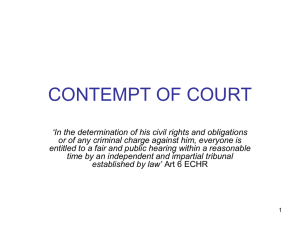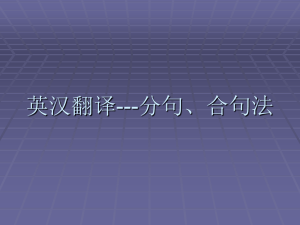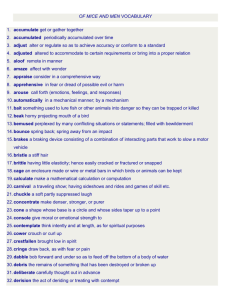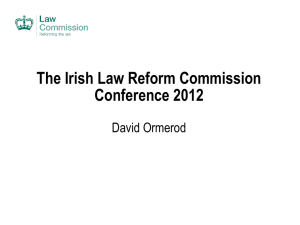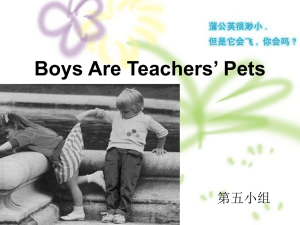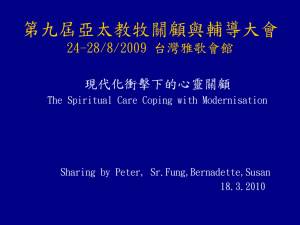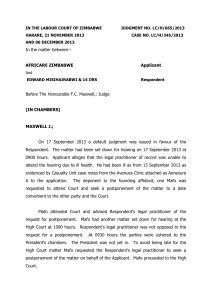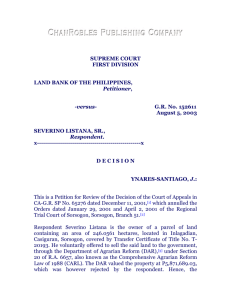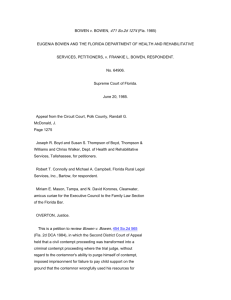MWANSA KAPEYA,REGINA CHISANGA KAPEYA v
advertisement
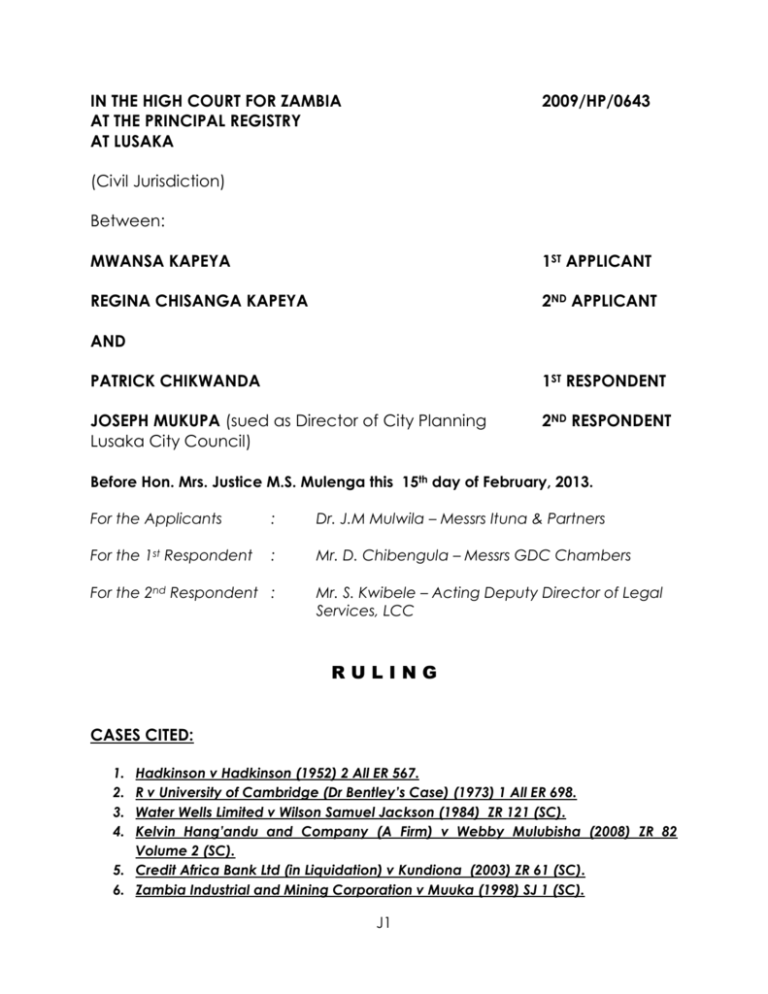
IN THE HIGH COURT FOR ZAMBIA AT THE PRINCIPAL REGISTRY AT LUSAKA 2009/HP/0643 (Civil Jurisdiction) Between: MWANSA KAPEYA 1ST APPLICANT REGINA CHISANGA KAPEYA 2ND APPLICANT AND PATRICK CHIKWANDA 1ST RESPONDENT JOSEPH MUKUPA (sued as Director of City Planning Lusaka City Council) 2ND RESPONDENT Before Hon. Mrs. Justice M.S. Mulenga this 15th day of February, 2013. For the Applicants : Dr. J.M Mulwila – Messrs Ituna & Partners For the 1st Respondent : Mr. D. Chibengula – Messrs GDC Chambers For the 2nd Respondent : Mr. S. Kwibele – Acting Deputy Director of Legal Services, LCC RULING CASES CITED: 1. 2. 3. 4. Hadkinson v Hadkinson (1952) 2 All ER 567. R v University of Cambridge (Dr Bentley’s Case) (1973) 1 All ER 698. Water Wells Limited v Wilson Samuel Jackson (1984) ZR 121 (SC). Kelvin Hang’andu and Company (A Firm) v Webby Mulubisha (2008) ZR 82 Volume 2 (SC). 5. Credit Africa Bank Ltd (in Liquidation) v Kundiona (2003) ZR 61 (SC). 6. Zambia Industrial and Mining Corporation v Muuka (1998) SJ 1 (SC). J1 WORKS REFERRED TO: 1. Halsbury’s Law of England, Fourth Edition Volume 9, para 106 This Ruling is on the two preliminary issues raised by the Applicants pursuant to Order 33 Rule 3 of the Rules of the Supreme Court (RSC) 1999 Edition that: 1. The Respondents are not entitled to prosecute or be heard on the various applications for orders including those to stay contempt proceedings; to stay order for demolition; and to set aside order for demolition, when they have not taken the first and essential step of purging the contempt. 2. The application by the 2nd Respondent filed on 31st January, 2011 that he may be substituted by an another officer of the Lusaka City Council after a similar application made on 3rd December, 2011 had been withdrawn is an abuse of the court process. The Applicants and the 2nd Respondent both filed arguments in support and in opposition, respectively. I will highlight the relevant submissions as I consider each of the two issues raised. I note that in some instances, both parties had gone beyond addressing the preliminary issue to submitting on what should be the merits or demerits of the substantive applications in issue. The first preliminary issue is that the Respondents are not entitled to prosecute or be heard on their various applications when they have not taken the first step of purging the contempt. J2 The Respondents applications include stay of contempt proceedings, settling aside of the Default Judgment and stay of the order of demolition. In the submissions, the Applicants cited the case of Hadkinson v Hadkinson (1952) 2 All ER 567 that: “It was plain and unqualified obligation of every person against or in respect of whom an order was made by a court of competent jurisdiction to obey it unless and until it is discharged and disobedience of such an order would as a general rule, result in the person disobeying it being in contempt and punishable by committal or attachment and in an application to the court by him not being entertained until he has purged his contempt. (emphasis added.) The Applicant thus argued that anyone who disobeys a court order is in contempt and that no application by such a person should be entertained by the Court until he has purged the contempt. In response, the 2nd Respondent stated that they ought to be heard as demanded by the broad principles of natural justice, citing the case of R v University of Cambridge (Dr Bentley’s Case) (1973) 1 All ER 698 that “no one ought to be condemned unheard.” That this was in line with Article 18 (1) of the Constitution. It was further submitted that the applications to stay contempt proceedings and to set aside the order for demolition superceeded and ranked in priority over the contempt proceedings stemming from a Judgment in default of appearance and defence. The case of Water Wells Limited v Wilson Samuel Jackson (1984) ZR 121 (SC) J3 was cited as stating that applications which may result in a judgment or order being set aside should be accorded priority over other proceedings stemming out of the judgment or order in issue. I have considered the submissions and note that what I have to determine at this stage is not the merits of the Respondents applications but whether the Court can hear the Respondents applications pending the final determination of the contempt proceedings and prior to the Respondents first purging the contempt. The Hadkinson1case cited by the Applicants appears to be a leading case on this subject. Apart from the portion of the holding outlined above stating the general rule and the Applicants emphasis on the portion that the alleged contemnors’ applications cannot be entertained until they have purged the contempt, the holding goes further to state per Lord Denning L.J that; “The court could only refuse to hear a party to a cause when the contempt impeded the course of justice by making it more difficult for the court to ascertain the truth or to enforce its orders…………” Romer L.J at page 570 of the same Judgment outlined the exceptions to the general rule that “a person can apply for the purpose of purging his contempt and another is that he can appeal with a view of setting aside the order on which the alleged contempt is founded.” This position is also clearly outlined in Halsburys Laws of England Fourth Edition Volume 9 at paragraph 106 that; J4 “The general rule is that a party in contempt, that is a party against whom an order of committal has been made, cannot be heard or take proceedings in the same cause until he has purged contempt;…… but this is subject to exceptions. Thus a party in contempt may apply to purge the contempt, he may appeal with a view of setting aside the order in which his contempt is founded, and in some cases he may be entitled to defend himself when some application is subsequently made against him………” It is thus clear that there are exceptions to the general rule. I note that the reference to appeals presupposes that there has been a final judgment or order which can only be set aside on appeal. In this instant case, the judgment upon which the orders were based is a Default Judgment which is liable to be set aside for good reason, to give opportunity for the parties to be heard on merit. The contempt proceedings were also not concluded and there is therefore no order of committal against the Respondents. In these circumstances, the Respondents can thus be heard on their applications which are with the view of setting aside the subject orders and Default Judgment. I also find that the alleged contempt does not impede the course of justice. This is based on the affidavits of the Respondents which show arguable cases for setting aside of the Default Judgment and order for demolition, among others, which are at the center of contention. This is line with what is stated in Order 52 Rules of the Supreme Court, 1999 Edition, particularly in paragraph 52/1/33 that: J5 “The proper approach is first to decide whether he has an arguable case and if so to decide whether the judgment should be set aside or the contempt proceedings should be adjourned until the appeal has been heard.” Based on all that has been discussed above and also taking into account the holding in the Water Well Limited2 case, I am satisfied that the Respondents applications can be heard pending the determination of the contempt proceedings in this matter. This preliminary issue thus fails. The second issue was that the 2nd Respondent’s application filed on 31st January, 2011 for substitution of party was similar to the earlier one made on 3rd December 2010, which was withdrawn and was therefore an abuse of court process. The record reveals that the application of 3rd December, 2010 was for substitution of Joseph Mukupa, the 2nd Respondent with the current holder of office of Director of City Planning. The application of 31st January 2011 was for substitution of Joseph Mukupa with Lusaka City Council as the body corporate to which the Order of Demolition was specifically addressed. The Applicants argued that the reasons advanced for substituting the 2 nd Respondent in both applications were substantially the same and therefore amounted to abuse of court process which was generally disapproved by the Supreme Court in the case of Kelvin Hang’andu and Company (A Firm) v Webby Mulubisha (2008) ZR 82 Volume 2 (SC). The J6 2nd Respondent’s response was that the application of 31st January, 2011 sought to substitute Joseph Mukupa with Lusaka City Council and not another officer of the Council. The case of Credit Africa Bank Ltd (in Liquidation) v Kundiona (2003) ZR 61 (SC) was cited in support that a party is allowed to file a current fresh application when an earlier application was procedurally wrong or had a mistake. That it was not disputed that the application of 3rd December, 2010 was irregular, hence its withdrawal. The second application was therefore not an abuse of court process and needed to be determined on merit. This second application was said to be premised on the provisions of the Local Government Act and the fact that the order of demolition was specifically addressed to the Council. The record shows that when the first application came up for hearing on 3rd December, 2010, the Legal Counsel from Lusaka City Council informed the Court that in view of the personal nature of the proceedings for contempt, she was withdrawing the application for substitution of the cited officer with another office holder. It is hence clear that this application was not determined by the court. The second application was made shortly after as the correct application. In view of these facts, the second application is neither res judicata nor does it amount to abuse of court process as submitted by the Applicants. The cited Kelvin Hangandu4 case deals with res judicata and multiplicity of actions. It cannot be stretched to cover the facts in this instant case. In Zambia Industrial and Mining Corporation v Muuka (1998) SJ 1 (SC), it was stated that there can be no res judicata if there has been no J7 adjudication. Further, in the Credit Africa Bank5 case cited by the 2nd Respondent, the Supreme Court stated that when an application is defeated on procedural lapse, it is open to the concerned party to bring the application afresh under the correct order or manner. The general principle of the justice system is that matters must be determined on merit hence where there are procedural lapses, the court must allow the parties to correct them even if it means recommencing an action afresh under the correct mode. That cannot be said to be an abuse of process. The second preliminary issue also fails. The preliminary issues are thus dismissed. Leave to appeal is granted. Dated this ……………….day of …………………………..2013. M.S. MULENGA HIGH COURT JUDGE J8
